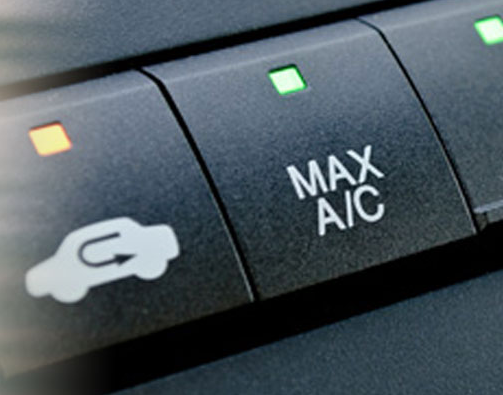
You want your vehicle’s air con system to work well throughout the summer. And when it doesn’t you probably want to know why. So lets go over the 5 important things you need to know about how car A/C works, when maintenance is needed, and when it might truly need a repair.
1) How Vehicle Air Con Works
Car air conditioning works pretty much the same as home A/C. Or a refrigerator. These all work as heat pumps to move heat from where you don’t want it to where it doesn’t matter.
So how do they work? Compressing a gas makes it hotter, and letting it expand makes it cooler. Heat pumps use a special gas (refrigerant) in a closed-loop cycle. First, a compressor pressurizes the refrigerant. It then goes through a condenser coil where a fan blows air over it to cool it back down. The hot air is dumped outside. It refrigerant then goes into an evaporator coil where it expands and cools down. Another fan blows air over that coil and into the area you want air conditioned. Most heat pumps take it to another level with refrigerants that liquefy in the condenser and return to a gas in the evaporator. That’s because phasing between gas and liquid releases or absorbs a lot of heat. Much like freezing ice or boiling water.
Going in to a bit more detail to understand more of what might break, every air conditioner has 5 major parts:
- compressor and motor (in car A/C the compressor is driven off the engine using a belt or pulley linked to the compressor through a clutch)
- condenser coil with fins to improve heat transfer
- a receiver/dryer (that acts as a filter) or an accumulator (storing excess refrigerant as well as filtering)
- an expansion valve or orifice tube
- evaporator coil with fins
2) Refrigerants and the Environment
The refrigerant gas is commonly called “Freon,” (a trade name) although this actually refers specifically to the original R-12 that’s no longer used. R-12 was a fluorocarbon, a category of compounds that were found to be destroying the earth’s protective ozone layer. They were banned in the 1990 and the ozone has been recovering.
Refrigerant R-1234YF is used in most late model vehicles manufactured from 2015 to date. Pacific Automotive can service your R-1234YF air conditioning system at a fraction of the cost, as a dealer alternative. Please call for details or to make an appointment.
In the auto industry R-134A is the only refrigerant permitted today, but soon HFO1234yf should be available as something cleaner and safer still.
3) When There’s a Problem
Some car air conditioner systems can go “forever” with regular servicing. But if you’re not getting enough cooling, you’re hearing strange noises, or there’s frost on part of the system then don’t wait until the next scheduled maintenance visit. And, yes, an air conditioner that’s low on Freon can actually frost up.
Perhaps all that’s needed is a Freon re-charge due to normal leakage. Otherwise repairs often involve replacing the receiver/dryer or accumulator. Other problems include a clogged orifice, a worn compressor clutch, or an electrical fault.
Be Aware: If the outside air is too cool the compressor won’t engage in order to prevent icing and possible subsequent damage. Also, in some vehicles the compressor won’t run if the engine isn’t idling fast enough. Both are normal.
4) Regular Air Con Servicing
Having your air conditioning system serviced regularly assures that everything’s working right so the A/C works less hard, cools better, and lasts longer. Servicing includes quite a few items on the checklist.
- inspect all hoses, electrical connections, belts, pulleys, valves, and thermostat
- inspect the compressor for wear that could cause noise or leaks
- check the condenser and evaporator coils for corrosion, dirt, or damaged fins
- check refrigerant levels (re-charging the refrigerant every few years is common)
- measure temperatures at air vents, condenser, and suction line to diagnose proper a/c performance
- check cabin air filters
- clean and disinfect evaporator coils and duct work
5) But Refrigerators Don’t Need Periodic Maintenance!?
True. But although the principle of operation is the same refrigerators are different. In a car the 5 major parts are connected by rubber hoses subject to leakage. There’s also o-rings and other seals at shafts that can wear and leak. But a ‘fridge has a specially sealed compressor and all connections are metal tubing, soldered together. Refrigerators work at comfortable indoor temperatures, but vehicle air con systems are exposed to the elements as well as sub-freezing to above-boiling temperatures. They also have to work a lot harder. It’s OK if a refrigerator takes a few hours to cool down after it’s been off for a while. But you want the interior of your car to cool off in just a few minutes.
Visit Pacific Auto for 10% Off and Pick Up / Delivery Service
We offer 10% off most services and we are now providing No Contact Pick Up and Delivery Service. We will email you the air con estimate for approval and we accept payment over the phone with credit card.
We’ve implemented precautions in accordance with guidelines from the World Health Organization (WHO) and Centers for Disease Control and Prevention (CDC),
Our ASE certified technicians and master mechanics work with the latest diagnostic equipment. We guarantee all our work. And we are open to serve you!
